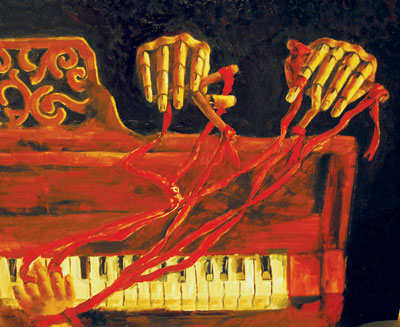All Nonfiction
- Bullying
- Books
- Academic
- Author Interviews
- Celebrity interviews
- College Articles
- College Essays
- Educator of the Year
- Heroes
- Interviews
- Memoir
- Personal Experience
- Sports
- Travel & Culture
All Opinions
- Bullying
- Current Events / Politics
- Discrimination
- Drugs / Alcohol / Smoking
- Entertainment / Celebrities
- Environment
- Love / Relationships
- Movies / Music / TV
- Pop Culture / Trends
- School / College
- Social Issues / Civics
- Spirituality / Religion
- Sports / Hobbies
All Hot Topics
- Bullying
- Community Service
- Environment
- Health
- Letters to the Editor
- Pride & Prejudice
- What Matters
- Back
Summer Guide
- Program Links
- Program Reviews
- Back
College Guide
- College Links
- College Reviews
- College Essays
- College Articles
- Back
A Gentleman's Guide to Love and Murder
A modern go-to for an instant classic, A Gentleman’s Guide to Love and Murder is a farcical spin-off of the everyday murder story and sappy love scenario. Keeping audiences on the edge of their seats with slapstick humor and eccentric personalities, this musical made its way to the 68th Tony Awards, earning its well-deserved spot as the Best Musical of 2014.
Based on the 1907 novel Israel Rank: The Autobiography of a Criminal by Roy Horniman, A Gentleman’s Guide to Love and Murder centers around Monty Navarro (Kevin Massey), a man who one day discovers that he is heir to the D’Ysquiths’ colossal family heritage. Determined to eliminate the eight other D’Ysquiths (John Rapson) ahead of him in the line of succession, he begins plotting each earl’s ‘accidental death’. As if there isn’t enough going on, Monty gets caught between two women, the fierily passionate Sibella Hallward (Kristen Beth Williams), and the sweet, pious Phoebe D’Ysquith (Adrienne Eller). And so Monty embarks on a (literally) cutthroat journey of revenge, humor, and of course, love.
The play bursts with witty humor, satirizing its theme of murder. Throughout, the musical is interwoven with a variety of absurd stunts, ranging from two full-grown men double riding a scooter to a quirky Egyptian dance. The play also made frequent use of mild vulgarity and offense, earning laughs and hoots from the audience. Toward the end, the play also contains several plot twists, keeping the crowd anxiously on edge.
The musical’s extreme focus on humor may have, however, backfired on the depth of the play. Although the play succeeded in gaining laughs from the audience, each character is not expounded upon and does not develop in character as the play progresses. A lot of potential growth is sacrificed in maintaining eccentric personalities, which is understandable due to the comedic nature of the musical.
In general, the story has very fast progression, concluding the death of each earl typically within one or two songs. The stage crew is well-coordinated, creating swift transitions for each fast-moving scene. Perhaps the most fascinating, however, is Rapson, who switches between the roles of eight distinct D’Ysquiths at an astonishing, breakneck speed. Skillfully crafting caricatures of each British upper class, Rapson establishes a uniquely eccentric personality for each earl. Massey, on the other hand, rivals Rapson with his firm tenor and precise diction. He, along with Williams and Eller, stuns the crowd with “I Decided to Marry You”, a complex musical number that involves simultaneous singing. The result is a well-executed harmony of three varying pitches, earning some of the loudest applauses throughout the entire show.
The inner stage comprises vintage style furniture and props and an antique-looking frame arched over it, fitting for the wealthy D’Ysquith family that mostly roams this space. The outer stage, most of the times occupied by commoners like Monty, suitably lacked most of the inner stage’s luxuries. The animated backdrop depicts the setting for each scene and allowed audiences to have a better understanding of the scene. Together with the orchestra, the backdrop helped accentuate the performers’ actions and significantly elevated, rather than upstaged, the quality of the acting.
A Gentleman’s Guide to Love and Murder is altogether a memorable comedy, receiving great response from both audiences and critics. Although the play lacked some depth, its quirky personas and witty humor most definitely earns it well-deserved laughter and applause. Without a doubt, A Gentleman’s Guide to Love and Murder killed it!

Similar Articles
JOIN THE DISCUSSION
This article has 0 comments.
